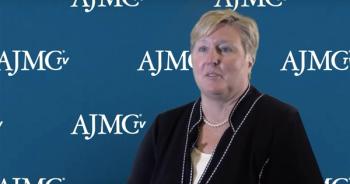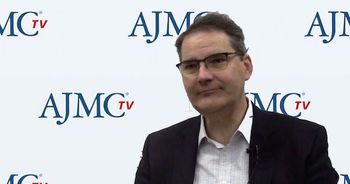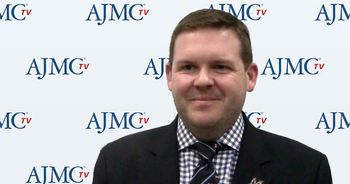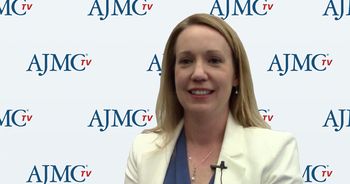
Brenden O’Hara, RPh, BCACP, from Blue Cross Blue Shield of North Carolina, talked about the pharmacist’s role in improving outcomes in value-based contracts and why collaboration is needed.

Brenden O’Hara, RPh, BCACP, from Blue Cross Blue Shield of North Carolina, talked about the pharmacist’s role in improving outcomes in value-based contracts and why collaboration is needed.

PIE, or a preapproval information exchange, is aimed at streamlining payer and health plan involvement so that it happens at the same time a drug developer submits an application to the FDA, instead of after a drug is approved, with the intent of speeding patient access to therapies.

Christina Polomoff, PharmD, BCACP, BCGP, discusses the differences between manufacturer coupons and cash cards and how they financially affect health plans and pharmacies.

COVID-19 has affected the pace of clinical trials, and the FDA’s most recent notice has been that there will be no “near-term” affect on approvals, said Leslie Fish, RPh, PharmD, who co-presented with Jeffrey Casberg, MS, RPh, in Tuesday’s session, "Drug Pipeline: Traditional Pharmaceuticals and Bisoimilars," at AMCP eLearning Days, which replaced the annual meeting of the Academy of Managed Care Pharmacy.

Douglas M. Long, MBA, vice president of industry relations for IQVIA, surveyed the effects of COVID-19 as he kicked off AMCP eLearning Days, a webinar series held in place of the annual meeting of the Academy of Managed Care Pharmacy (AMCP).

At the end of the day, the focus should be on improving the efficiency of our healthcare system and bringing cost-effective care to patients, said Jane Barlow, MD, MPH, MBA, EVP and Chief Clinical Officer for Real Endpoints.

Sebastian Schneeweiss, MD, ScD, professor of medicine and epidemiology, Harvard Medical School and Brigham and Women's Hospital, and co-founder of Aetion, discusses current use of rapid-cycle analytics and what efforts are needed to improve understanding and uptake.

Crescent Moore, PharmD, PhD, BCPS, senior consultant, BluePeak Advisors, explains efforts by CMS to address the opioid epidemic put forward by their 2020 Call Letter.

There’s a lot of room to move in terms of improving management of medications, said Michael Steinman, MD, professor of medicine, University of California, San Diego.

Sebastian Schneeweiss, MD, ScD, professor of medicine and epidemiology, Harvard Medical School and Brigham and Women's Hospital, and co-founder of Aetion, explains how rapid cycle analytics of real-world evidence can be used to evaluate the safety and efficacy of newly approved drugs.

Crescent Moore, PharmD, PhD, BCPS, senior consultant, BluePeak Advisors, discusses how CMS is planning on implementing care coordination programs in Medicare.

Using rapid-cycle analytics of real-world evidence, we can get patients on the most appropriate medications and also implement medication adherence interventions, explained Sebastian Schneeweiss, MD, ScD, professor of medicine and epidemiology, Harvard Medical School and Brigham and Women's Hospital, and co-founder of Aetion.

Multimorbidity in older patients creates a challenge because you're dealing with multiple diseases and multiple medications, explained Michael Steinman, MD, professor of medicine, University of California, San Diego.

CMS has given plan sponsors the flexibility to choose which drug therapy categories they’d like to administer the Part B step on, explained Crescent Moore, PharmD, PhD, BCPS, senior consultant, BluePeak Advisors,

Technology allows for additional avenues to engage with patients and make us more available to them, explained Brian MacDonald, PharmD, manager, Specialty Clinical Programs, Magellan Rx Management.

Leveraging technology to perform real-time prescription benefit checks could give patients and providers personalized cost knowledge when a drug is being prescribed, but standardization of the process is needed for wider uptake, according to a session at the Academy of Managed Care Pharmacy Managed Care & Specialty Pharmacy Annual Meeting.

A trio of posters presented at the Academy of Managed Care Pharmacy Managed Care & Specialty Pharmacy Annual Meeting show that high healthcare utilization leads to substantial costs among individuals living with HIV, but prompt initiation of antiretroviral therapy (ART) regimens after diagnosis can help contain costs in both Medicaid-covered and commercially insured patients.

Michael Steinman, MD, professor of medicine, University of California, San Diego, discusses effective strategies for improving medication management for patients and how these strategies can improve outcomes, such as medication adherence.

A study found that out of hundreds of specialty drugs, only 16% were covered in the same way by 17 commercial payers in the United States, meaning that 84% of those specialty drugs had differing coverage, explained James D. Chambers, PhD, MPharm, MSc, associate professor, Institute for Clinical Research and Health Policy Studies, Tufts Medical Center.

Panelists discuss what PCSK9 inhibitors are, the evidence to support them, and challenges with operationalizing them in practice.

Gene therapy provides an opportunity for every patient to become not a patient, to become an individual, and you can’t put a cost on that, explained Sophie Schmitz, BA, MA, managing partner, Partners4Access.

The Institute for Clinical and Economic Review will work with drug manufacturers, patients, and clinical experts to get supplemental information of newly approved drugs, explained Steven Pearson, MD, MSc, president, ICER.

Several efforts are underway nearly a year after the Trump administration released its blueprint to lower drug prices in May 2018, but tracking their outcomes depends on what metric is used to define drug prices, according to a session at the Academy of Managed Care Pharmacy Managed Care & Specialty Pharmacy Annual Meeting, held March 25-28 in San Diego, California.

Utilization management tools and formulary designs are components of a multifaceted strategy to curb opioid overdose death rates, but they must be applied in a flexible manner, according to speakers at the Academy of Managed Care annual meeting.

Crescent Moore, PharmD, PhD, BCPS, senior consultant, BluePeak Advisors, discusses changes to Medicare Part D expected to come in 2020 and their implications.

Rapid-cycle anlytics of real-world evidence has an advantage over current strategies for analyzing real-world evidence because it is efficient, transparent, and scientifically validated, Sebastian Schneeweiss, MD, ScD, professor of medicine and epidemiology, Harvard Medical School and Brigham and Women's Hospital, and co-founder of Aetion.

Aimee Tharaldson, PharmD, senior clinical consultant in emerging therapeutics for Express Scripts, presented her look at the development pipeline to a crowded room at the Academy of Managed Care Pharmacy Annual Meeting, held March 25-28 in San Diego, California.

In a session at the Academy of Managed Care Pharmacy Annual Meeting held March 25-28 in San Diego, California, speakers discussed the value-based contract process in Medicaid from both the manufacturer and the payer perspectives.

Somali Burgess, PhD, senior director, Xcenda, discusses how patient-reported outcomes (PROs) help advance patient care and challenges with translating PROs into clinical and pharmaceutical decisions.

Kimberly Lenz, PharmD, clinical pharmacy manager, MassHealth/Office of Clinical Affairs, University of Massachusetts Medical School discusses initiatives introduced to implement appropriate opioid prescribing, best practices for enforcing appropriate prescribing, and if current opioid restrictions have reduced utilization.

259 Prospect Plains Rd, Bldg H
Cranbury, NJ 08512
© 2025 MJH Life Sciences®
All rights reserved.
